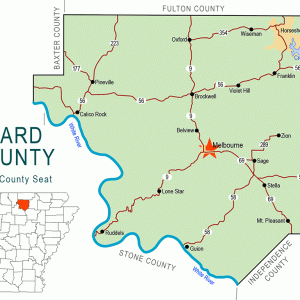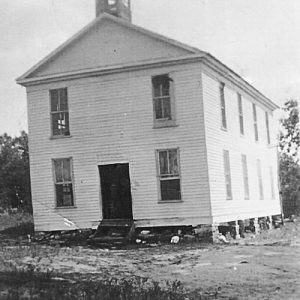calsfoundation@cals.org
Lunenburg (Izard County)
The unincorporated community of Lunenburg, located on Rocky Bayou approximately four miles south of the Izard County seat of Melbourne, is one of the county’s earliest settlements.
The earliest land claim record is that of Adam Walker in 1820. While many early settlers were attracted to the area by plentiful water and fertile land, much early growth can be attributed to a local Baptist organization. About 1833, the Rocky Bayou Baptist Association was established in the area, with a log church built shortly afterward. A second church was constructed in 1858. Many of the area churches trace their origins to the association. Other denominations also were soon established.
By the mid-1840s, a sizeable settlement and business district, known as Rocky Bayou, was developing. A general store was the first business established, to which a saloon was soon added. Within a few years, the settlement included a sawmill, two cotton gins, a gun powder mill, a blacksmith, a tannery, a cider mill, three general stores, and a school.
When war broke out in 1861, many local men joined Confederate forces, while others remained loyal to the Union. The Skirmish at Lunenburg, fought on January 20, 1864, is an example of such division. Many of the skirmish’s combatants serving in the Fourth Arkansas Mounted Infantry Volunteers (US) and Colonel T. R. Freeman’s Confederate forces were residents of Izard County. Confederate forces suffered four wounded and two captured, while the only death was a Union soldier. A marker to commemorate the skirmish was placed at the community center in 2010.
Stability slowly returned to the area after the war. The settlement existed for many years without a post office, but, as a post office was being established after the war, a name change was being contemplated. Local tradition holds that a man of German descent in the saloon blurted out: “Name her Lunenburg, by Gott!” Originally spelled with an ending H, the name was submitted and accepted, and the post office, with postmaster Robert Case, was established on February 3, 1868.
In 1868, community residents donated material and labor to construct a new two-story school. Approximately half of the resources were provided by the International Order of Odd Fellows; in return, the lodge used the second floor for meetings. This building remained in use until a new one was occupied in the 1930s. Grades 1–8, with some high school instruction, were taught there until consolidation with Melbourne following the 1948–49 school year. The original school building collapsed in 1989, while the second one was renovated for use as a community center operated by the Lunenburg Community Center Association.
Being somewhat isolated, with no major highway or railroad connections, the community began a steady decline with the closing of the school. Another blow was the closing of the post office on July 31, 1955. As of 2010, about all that remains of the once-thriving settlement are a few stone fence rows, a cemetery, ruins of the log saloon, and the community center.
Respected Arkansas journalist Henry Karr Shannon was a native of Lunenburg. For approximately twenty-seven years (1944–1971), Shannon wrote a popular daily column, “Run of the News,” for the Arkansas Democrat.
For additional information:
O’Neal, Leeda Mankin. “An Old and Beloved Town.” Izard County Historian 7 (October 1976): 3–22.
Shannon, Karr. A History of Izard County. Little Rock, AR: Democrat Printing and Lithographing Company, 1947.
Stroud, Larry. “Lunenburg Has Colorful History: Saloon Played Role in Naming Town.” Izard County Historian 35 (January 2010): 4–7.
Mike Polston
CALS Encyclopedia of Arkansas
 Izard County Map
Izard County Map  Lunenburg School
Lunenburg School 




Comments
No comments on this entry yet.